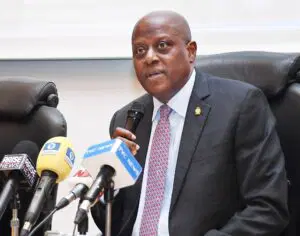Business
We need strong, resilient banks to achieve $1trn economy — CBN

The Central Bank of Nigeria (CBN) has reaffirmed the need for strong, stable, and resilient banks to achieve President Bola Tinubu’s target of a $1 trillion economy by 2030.
Speaking at the 36th CBN Seminar for Finance Correspondents and Business Editors held in Abuja, Deputy Governor of Corporate Services, Ms. Emem Usoro, emphasised that ongoing efforts to recapitalise banks are a vital step in realising this goal. Represented by Acting Director of Corporate Communications, Mrs. Hakama Sidi-Ali, Usoro said bank recapitalisation will empower financial institutions to fund large-scale projects and compete globally.
“As we work towards building a one-trillion-dollar economy, we must consider the recapitalisation of our banks to finance and power the economy,” she said. “Banks must be strong enough to support development projects and effectively carry out financial intermediation.”
She added that Nigeria’s current GDP stands at around $250 billion, indicating a significant gap that would require strategic planning, consistent policy direction, and the full engagement of economic stakeholders.
The global financial architecture, she noted, has evolved, particularly since the Trump administration in the U.S., making it crucial for Nigerian banks to align with global opportunities and risks through responsive policies.
In his presentation, Director of Banking Supervision at the CBN, Dr. Olubukola Akinwumi, explained that the recapitalisation strategy now focuses on helping banks meet their Cash Reserve Requirement (CRR) obligations and participate in infrastructure financing.
He said, “A well-capitalised bank can support large transactions and benefit from government initiatives such as infrastructure concessions. Stronger banks can lend more, especially to priority sectors like agriculture, manufacturing, and SMEs, which are engines of growth.”
Akinwumi stressed that these sectors remain central to the government’s development plans, as reflected in the 2025 national budget, which prioritises education, health, agriculture, and infrastructure.
Adding an industry voice, UBA Managing Director, Mr. Oliver Alawuba, urged greater trust in Nigerian banks, suggesting that part of the country’s external reserves be managed locally to build confidence and boost economic growth.
“We manage the reserves of other African countries. Nigerian banks should be trusted with at least 10 to 20 percent of our own reserves,” he said.
However, Alawuba raised concerns about the feasibility of reaching the $1 trillion goal, citing Nigeria’s current annual growth rate of 3.8 percent—far below the 10 percent minimum required to meet the target by 2030.
He called for synergy between fiscal and monetary authorities to support the financial sector in driving sustainable economic transformation.
Banking
Chiderije Mbah Wins One Day MD/CEO Of Wema Bank PLC

- … Set To Run The Bank’s Affairs For 24 Hours In An Unforgettable Children’s Day Experience
In a heartfelt celebration of 2025 Children’s Day, Wema Bank, Nigeria’s most innovative bank and pioneer of Africa’s first fully digital bank, ALAT, has unveiled 12-year-old Chiderije Mbah as its One-Day Managing Director/CEO for May 27, 2025, as part of a special initiative aimed at nurturing the next generation of Nigerian leaders. The memorable experience, which took place today, at the bank’s headquarters in Lagos, Marina, spotlighted Wema Bank’s ongoing commitment to investing in the future even as it marks 80 remarkable years of legacy and impact.
Chiderije Mbah became the winner of the One-Day Wema Bank MD/CEO initiative launched in May 2025, to mark this year’s Children’s Day celebration. He was chosen after sharing a spirited video explaining his dream of leading a bank and his vision for making finance more fun and accessible for children. His entry, submitted through a social media challenge, stood out among dozens who applied to be in the position.
The One-Day Wema Bank MD/CEO was the high point of a broader Children’s Day initiative by Wema Bank, which invited children across the country to participate in an online challenge. To qualify, children were asked to post a short video dressed in Wema colours and share the banking role they aspired to, while either holding or opening a Royal Kiddies Account (for ages 0–12) or an ALAT Xplore Wallet (for teenagers 13–17). The campaign blended fun with purpose, introducing thousands of young Nigerians to early financial education and the power of dreaming big.
On Tuesday, May 27, 2025, Chiderije stepped into the spotlight at Wema Bank’s Lagos Headquarters, receiving a purple-carpet welcome and taking his seat at the helm of the bank for a day packed with leadership, learning, and excitement. Enjoying a full day of activities; from a guided tour of the head office to holding his own executive briefing session in the boardroom, he will also be addressing senior executives of the bank.
“This is the best day of my life,” said Chiderije Mbah. “Wema Bank made me feel important. I am learning so much about being a leader and how banking works. I’ll tell all my friends to open a Wema Bank Royal Kiddies Account so they can also start learning how to save and maybe one day, they can be MD too!”
Speaking on the initiative, Wema Bank’s Managing Director/CEO, Moruf Oseni, said,
“Our 80th anniversary is a time to reflect on where we’ve been and where we’re going, knowing fully well that the future belongs to the young stars like Chiderije. Today’s activity is one of our ways of showing that we believe in the children, that we’re listening, and that we’re committed to helping them succeed financially, personally, and professionally all the way.”
This unforgettable experience reinforces Wema Bank’s vision of a future-ready Nigeria; one where financial inclusion starts early, and every child has access to tools, inspiration, and opportunities to thrive. As Wema bank celebrates eight decades of resilience and innovation, its gaze remains firmly fixed on the horizon, championing the dreams of tomorrow’s leaders, one child at a time.
Business
Crude oil price crashes, puts 2025 FG revenue target in jeopardy

The price of Bonny Light, Nigeria’s premium crude oil grade, dropped by 5.09 percent to $59.62 per barrel on Wednesday, amid rising tensions from the ongoing global tariff war sparked by recent tariff hikes announced by the United States.
The downward trend in oil prices was further compounded by the Organisation of Petroleum Exporting Countries (OPEC) and its allies’ decision to raise oil production by 411,000 barrels per day starting in May 2025.
The price plunge comes as a major concern for Nigeria, whose N54.99 trillion 2025 national budget is predicated on a benchmark oil price of $75 per barrel and a production target of 2.06 million barrels per day (bpd). Current output, including condensates, stood at 1,671,953 bpd as of February 2025, according to the Nigerian Upstream Petroleum Regulatory Commission (NUPRC).
Speaking to Vanguard, Dr. Muda Yusuf, CEO of the Centre for the Promotion of Private Enterprise (CPPE), described the situation as a “serious problem.” He warned that the decline could severely impact government revenue and weaken the exchange rate.
“This poses a risk to our revenue and foreign exchange earnings. We all know the implications of a weak exchange rate on the economy,” Yusuf said.
Despite the broader economic risks, lower crude prices may offer relief at the pump for Nigerian consumers. Findings by Vanguard indicate that domestic petrol prices may fall as downstream operators prepare for a likely reduction in Premium Motor Spirit (PMS) prices.
Ehimen Joseph, Chairman of the Lagos State Chapter of the Petroleum Products Retail Outlet Owners Association of Nigeria (PETROAN), told Energy Vanguard, “This should be expected in a deregulated market. If the fall in crude oil prices persists, it would affect pricing along the entire value chain.”
Another industry source, who requested anonymity, said: “Everything is pointing towards a pump price reduction this week. One of the refineries has stopped issuing petrol tickets, anticipating a price review before Tuesday.”
Depot prices have already begun to reflect the trend. Data from petroleumprice.ng shows declines across major players: Mainland dropped from N920 to N918 per litre, A.Y.M from N920 to N919, and Ever from N920 to N918. Prudent, Eterna, and Soroman also saw slight reductions, with Eterna dropping from N900 to N897 per litre.
Meanwhile, OPEC has reaffirmed its commitment to monitoring the global oil market. A recent virtual meeting of eight OPEC+ countries—Saudi Arabia, Russia, Iraq, UAE, Kuwait, Kazakhstan, Algeria, and Oman—held on April 3, 2025, reviewed market conditions and reaffirmed output increases to stabilize global supply.
The situation continues to evolve, with both global market forces and domestic economic managers under pressure to adapt quickly to the unfolding realities.










